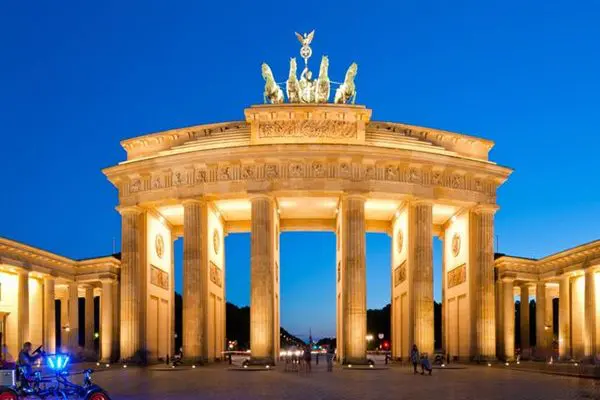Highlights of Christmas Markets: Munich to Vienna Trip Notes
Trip Overview
PrintWelcome to the ultimate German and Austrian Christmas Markets tour! Start your adventure in Germany and soak up the festive spirit at its famous markets in Munich, Nuremberg, and Dresden. Explore the charming streets adorned with twinkling lights and the sweet scent of mulled wine and gingerbread cookies. From there, head to Austria and discover the magical Christmas markets of Salzburg, Vienna. Shop for unique handcrafted gifts, savor traditional cuisine, and marvel at the enchanting atmosphere of the holiday season. This tour offers the perfect blend of history, culture, and holiday cheer in two of Europe’s most stunning countries. Book your trip today and create unforgettable memories!
Duration : 6 Days
Destination : Christmas Markets
Start/Ends in : Munich / Vienna
Group Size :13-42 People
Age Req. : 18+
Trip Theme : Discovery
Departs : November to December
Arrival Details
The group welcome meeting with you guide and other travellers is held around 18:30 at the hotel lobby on Day 1 of your tour, unless otherwise notified.
Meeting Point:
The meeting point for this tour is:
Holiday Inn Westpark – Munich
Address: Albert-Roßhaupter-Straße 45, 81369 München, Germany
Phone: +49 89 4111130
Please confirm with Customer Service Team
Emergency Number: +44 203 14 99 200
Airport Transfers:
To arrange your airport transfer please email us the following information at least 2 weeks before your departure date: [email protected]
Travel Date, Flight Number, Local Arrival Time, Name/s of the Passengers
Finishing Point:
The finishing point for this tour is:
Arcotel Kaiserwasser or Austria Trend Hotel Ananas – Vienna
Please confirm with Customer Service Team
Emergency Number: +44 203 14 99 200
Highlights
Vienna: Austria’s imperial jewel exudes elegance with its opulent palaces, classical music heritage, and vibrant cultural scene.
Salzburg: The birthplace of Mozart, enchants with its baroque architecture, alpine surroundings, and the iconic Hohensalzburg Fortress.
Munich: The heart of Bavaria in Germany, combines a rich cultural heritage with a lively beer culture, highlighted by the annual Oktoberfest celebration and impressive landmarks like the Marienplatz.
Itinerary
Please note that the itinerary may be subject to small changes depending on the conditions during the tour. Alternative accommodation of similar standards may be used depending on the group size and hotel availability.
Inclusions & Exclusions
The tour price covers the following services:
Accomodation : 4 star hotels
Meals : 5 breakfasts
Transportation : Air-conditioned modern non-smoking coach or mini-bus
Guide : Services of experienced Travel Talk local guides
Sightseeing: Munich, Vienna, Salzburg
What is NOT included in the tour price?
- Any flights not mentioned above
- Travel insurance
- Meals not stated above
- Items of a personal nature
- Tips & gestures
- Entrance fees to the sights and museums
- Optional activities
- Other services not stated in the itinerary
Hotels & Accomodation
Solo travellers will be roomed with another solo traveller of the same gender in a twin or triple room, or can upgrade to a solo room by paying the single supplement. You may choose the solo room option when booking online or contact us to arrange a private room. Your tour leader will allocate rooms upon arrival at the starting hotel in accordance with the rooming lists, last minute changes may not be guaranteed.
Holiday Inn Westpark
Theater Hotel
Arcotel Kaiserwasser
Austria Trend Hotel Ananas
Distances
Please find below the approximate driving times between the destinations visited in Central Europe. We will always strive to take a short break every few hours to enable passengers to stretch their legs, purchase snacks and use wash facilities during long drives. Please note that crossing borders may take only several minutes or up to a few hours, depending on how busy the border control is. The driving times listed below do not take into account the waiting time to cross the border.
Vienna – Salzburg: 300 km – 3 hrs
Salzburg – Munich : 215 km – 2.5 hrs
Budgeting
Please note that entrance fees to sights and optional activities are not included in the tour price. Optional activities are not operated by Travel Talk and may require a certain number of attendees to run. Your guide will be happy to inform you further about the available optional activities at the start of your tour. Optional activities are also listed under each day in your tour itinerary.
Tipping
In Central Europe, tipping practices vary across countries, but it is generally customary to leave tips in restaurants and other service establishments. In Germany, Austria, Switzerland, the Czech Republic, Poland, and Hungary, tipping around 5-10% in restaurants is common, with rounding up the bill also widely accepted. Slovakia tends to be more lenient regarding tipping. It’s important to check for included service charges, as practices can differ. When in doubt, observing local customs or asking locals for guidance can help ensure appropriate tipping in each specific cultural context.
Shopping
Shopping in Central Europe offers a diverse and vibrant experience, reflecting the rich cultural tapestry of the region. From bustling markets to modern shopping districts, each country brings its unique flavor to the retail scene. In cities like Vienna, Prague, and Budapest, you can explore historic marketplaces offering traditional crafts, local delicacies, and unique souvenirs. High-end fashion enthusiasts will find luxury boutiques in cities such as Zurich and Vienna, while eclectic shops in Berlin and Warsaw cater to avant-garde tastes. Central Europe is also known for its Christmas markets, where during the holiday season, festively decorated stalls showcase handmade crafts, seasonal treats, and a warm, festive atmosphere. Whether seeking traditional folk art or cutting-edge fashion, shopping in Central Europe is a delightful journey through both the contemporary and the culturally authentic.
Central Europe is not a precisely defined geographical or political entity, but it often includes countries such as Germany, Austria, Switzerland, the Czech Republic, Poland, Hungary, and Slovakia. These countries have different currencies:
- Germany: Euro (EUR)
- Austria: Euro (EUR)
- Switzerland: Swiss Franc (CHF)
- Czech Republic: Czech Koruna (CZK)
- Poland: Polish Złoty (PLN)
- Hungary: Hungarian Forint (HUF)
- Slovakia: Euro (EUR)
Personal Spending
Coffee: 5 RON (1 EUR)
Sandwiches: 6 RON Baht (1.20 EUR)
Fresh pastry: 3 RON (0.60 EUR)
Local beer: 6 RON (1.20 EUR)
Water (1.5L): 4 RON (0.80 EUR)
One-way public bus ticket: 2.50 RON (0.50 EUR)
Mid-range restaurant meal: 25 RON (5 EUR)
Essential Information: Central Europe
Passport & Visas
Many Central European countries are part of the Schengen Area, allowing for borderless travel within member countries. If you need a visa, obtain a Schengen Visa, which covers multiple countries. Ensure your passport is valid for at least six months beyond your planned departure date. Check the visa requirements for each specific country you plan to visit, as they may vary based on your nationality and the duration of your stay. The Euro is widely used in some countries, while others, like Hungary and Czech Republic, have their own currencies.You need to have valid and adequate travel insurance before your tour with Travel Talk begins.
This information is provided only as a guidance, we strongly advise that you check with the consulate or embassy as this information can change at any time and with little notice. It is your responsibility to make sure that all the required travel documents are ready when travelling.
Travel Advice
We are closely monitoring the latest travel updates to Central Europe, and following the advice of the UK Foreign Office. For the latest travel advice from UK Foreign, Commonwealth & Development Office (FCDO), please visit: https://www.gov.uk/foreign-travel-advice/
We recommend all travellers to check their Government National Travel Advisory prior to their departure:
Australia – https://www.smartraveller.gov.au/
Canada – https://travel.gc.ca/
New Zealand – https://www.safetravel.govt.nz/
USA – https://travel.state.gov/
Travel Insurance
All passengers travelling with Travel Talk are required to have personal travel insurance before participating in any of our tours. Your guide will collect your travel insurance details on the first day of your trip. It is your responsibility to make sure you have an adequate and suitable travel insurance for you in place, you may read more at https://www.traveltalktours.com/travel-insurance
Health & Safety
The health and safety of our passengers, staff and communities visited is of utmost priority. As we monitor and comply with the official advice from the UK Foreign Office, as well as World Health Organization and government authorities regularly, we have implemented several policies and precautions on our tours for your wellbeing. You may find our Safe Travels Protocols at https://www.traveltalktours.com/safe-travels
Travel Talk Adventures has received the Safe Travels stamp by the World Travel and Tourism Council (WTTC), which allows travellers to recognise companies around the world that have adopted health and hygiene global standardised protocols – so consumers canexperience ‘Safe Travels’.
Please make sure to regularly check your Government’s travel advice before travelling and be well-informed of any requirements. Your tour guide will also notify you of the regulations and protocols to follow throughout your trip with us.
Please note that if any traveller is unable to complete the itinerary or possess a potential risk to themselves and/or the rest of the group, we reserve the right to remove them from all or part of a trip.
Please consult with your doctor for the latest medical travel information and any vaccinations you may need. We recommend that you bring any personal medical requirements and medications with you as these may be difficult to obtain while on tour.
Weather
Generally, the best time to visit Central European countries like Germany, Austria, Czech Republic, and Hungary is during the late spring (May to June) and early autumn (September to October). During these months, the weather is generally mild, with pleasant temperatures and blooming landscapes. Tourists can enjoy outdoor activities, cultural events, and explore historic sites without extreme temperatures or overcrowding. Summer (July and August) can also be a good time, but it tends to be busier, and some regions may experience warmer weather. Winter (December to February) is ideal for those interested in festive holiday markets and winter sports, but temperatures can be quite cold.
The Summer months of July and August are considered Europe’s busiest with high temperatures attracting flocks of locals and travellers to the breath-taking coastal regions. The Winter months between December and March are quite colder with occasional snow.
Check out our weather guide for the best time to visit Central Europe.
Eating & Drinking
Central European cuisine is a flavorful journey through a diverse range of culinary traditions, blending influences from Germany, Austria, the Czech Republic, and Hungary. Hearty and comforting, the cuisine reflects the region’s agricultural abundance and historical influences.Germany is renowned for its sausages, pretzels, and savory dishes like sauerkraut and schnitzel. In Austria, the culinary scene is marked by the elegance of Viennese coffeehouses and iconic pastries like Sachertorte, while hearty stews and dumplings showcase the country’s Alpine influences. The Czech Republic offers a mix of rich and comforting dishes like svíčková (marinated sirloin) and trdelník, a sweet pastry delight. Hungary, known for its bold flavors, introduces the world to goulash, a hearty meat stew spiced with paprika, and lángos, a popular fried dough snack.
- Weißwurst (Munich, Germany) – A Bavarian delicacy, Weißwurst is a tender veal and pork sausage seasoned with parsley, lemon, and cardamom, traditionally served with freshly baked pretzels, sweet mustard, and a refreshing wheat beer, making it a must-try breakfast dish in Munich.
- Schweinsbraten (Munich, Germany) – A slow-roasted pork dish seasoned with caraway seeds, garlic, and marjoram, Schweinsbraten is accompanied by a crispy crackling and served with hearty potato dumplings and a rich gravy, offering a quintessential taste of Bavaria’s rustic flavors.
- Salzburger Nockerl (Salzburg, Austria) – A cloud-like dessert of fluffy, sweet soufflé dusted with powdered sugar, Salzburger Nockerl represents Salzburg’s mountainous landscape and is often served with a berry compote, making it a sweet and airy end to any meal.
- Wiener Schnitzel (Vienna, Austria) – Vienna’s most iconic dish, Wiener Schnitzel is a thin veal or pork cutlet, breaded and fried to golden perfection, traditionally served with a side of lemon, parsley potatoes, or a light cucumber salad, and it’s a must for any visitor seeking authentic Austrian flavors.
- Gulyás (Budapest, Hungary) – A hearty Hungarian stew made from tender beef, paprika, and an array of root vegetables, Gulyás is served with fresh bread and embodies the deep, smoky flavors of Hungary’s rustic cuisine, warming you with its rich and savory broth.
- Halászlé (Budapest, Hungary) – A fiery and aromatic fisherman’s soup made from fresh river fish such as carp and catfish, seasoned generously with sweet Hungarian paprika, Halászlé delivers a spicy and flavorful kick that celebrates Hungary’s love for bold and hearty soups.
- Bryndzové Halušky (Bratislava, Slovakia) – A comfort food classic, Bryndzové Halušky features soft potato dumplings smothered in creamy sheep’s cheese (bryndza) and topped with crispy bits of bacon, offering a rich and satisfying bite that showcases Slovakia’s pastoral heritage.
Essentials to Bring & Internet
-Face mask/cover and hand sanitiser enough for your personal use throughout the trip – See more at https://www.traveltalktours.com/safe-travels/
-Travel Documents: Passport, Visa (if required), flight or transport ticket (and photocopies)
-Travel Talk Tour Voucher (printed or digital)Travel Insurance Policy (and photocopy)
-Personal medical kit and medicine
-Money (cash, credit card, travellers’ cheques)
-Power Adapter
-Reusable water bottle
-Ear plugs and eye mask
-Sun protection – hat, sunglasses, sunscreen
-Comfortable, closed walking shoes
-Wind/water proof jacket
-Warm clothes, hat, and gloves for cold weather
-Sandals, swimwear, shorts for warm weather
Internet Access
Complimentary Wi-Fi is available in most hotels, some cafes, and restaurants visited during Travel Talk tours. If you come from another EU Country, you may be able to use your phone without any additional roaming charges, please consult with your mobile provider. Make sure to enable data roaming on your mobile if you
wish to use 3G/4G abroad, although the connection may be unreliable in smaller towns and rural areas. Purchasing a European SIM card for the duration of your tour may be a cost-effective option. Your guide will be happy to advise on this.
Culture and Traditions
Central Europe boasts a culturally diverse tapestry shaped by centuries of historical, artistic, and intellectual influences. This region, comprising countries like Germany, Austria, the Czech Republic, and Hungary, reflects a unique blend of traditions stemming from its rich history.From the grandeur of imperial Vienna to the medieval charm of Prague, Central Europe’s architecture stands as a testament to its multifaceted past. The cultural scene is vibrant, with renowned classical music heritage, literature, and world-class museums. Central Europeans take pride in their festivals, often rooted in age-old traditions, and their appreciation for the arts, making the region a fascinating mosaic of cultural expressions, both traditional and contemporary.
Austria: Austria boasts a rich cultural heritage that has greatly influenced the world. Known for its classical music traditions, the country was home to composers like Mozart, Beethoven, and Strauss. Vienna, the capital, is synonymous with opulent palaces, classical concerts, and elegant coffeehouses. Austrian culture places a strong emphasis on the arts, from impressive museums to the Vienna State Opera. The country also takes pride in its culinary delights, with a culinary scene that blends traditional Austrian cuisine with modern twists.
Germany: Germany’s culture is a captivating mix of history, innovation, and artistic expression. Renowned for its contributions to classical music, philosophy, and literature, Germany has been home to figures like Bach, Goethe, and Beethoven. Modern Germany is a hub of technological innovation and design, and its cities seamlessly blend historic architecture with contemporary flair. The country’s love for beer and festivals, such as Oktoberfest, reflects its vibrant and sociable character. Germany’s cultural diversity is also evident in regional traditions, dialects, and culinary specialties.
Czech Republic: The Czech Republic, with its capital Prague, is steeped in history and architectural splendor. Its medieval towns and castles transport visitors back in time. Czech culture is deeply connected to its literature, with figures like Kafka leaving a lasting impact. The love for beer is a notable cultural trait, with the country having the highest beer consumption per capita in the world. The Czechs also celebrate a range of folk traditions and festivals, emphasizing a strong connection to their roots and heritage.
Hungary: Hungary, with Budapest as its capital, offers a unique blend of Eastern and Western influences. The country is known for its thermal baths, a testament to its rich spa culture. Hungarian cuisine, with dishes like goulash and chimney cake, reflects a hearty and flavorful culinary tradition. Hungarian folk music and dance play a significant role in cultural celebrations, and the language, unlike its neighbors, is not of Indo-European origin, adding to the country’s distinct identity. Hungary’s history, from the Magyar tribes to the Ottoman and Austro-Hungarian empires, has left an indelible mark on its culture.
How to Dress
Dressing in Central and Eastern Europe involves adapting to diverse climates, local customs, and urban-rural variations. Casual wear like jeans and T-shirts is generally acceptable for everyday activities, while smart casual attire may be appropriate for formal occasions and nicer restaurants. Consider the season and pack accordingly, with warm clothing for cold winters and lightweight options for warm summers. Modesty is advised in religious or traditional settings. Comfortable walking shoes are essential, especially in urban areas with cobblestone streets. Pay attention to local fashion trends but prioritize practicality, and be mindful of the specific norms in the country and city you are visiting.
Solo Travellers
We have many solo travellers joining our tours. Solo travellers will be roomed with another traveller of the same gender. If you would like a private solo room, subject to availability and a single supplement, please contact us.
Rules to Follow
We are committed to ensuring a safe and enjoyable experience for everyone. We do not tolerate any form of violence (physical or verbal), bullying or harassment involving customers, partners, Travel Talk staff or locals. Sexual relationships between a tour leader and a passenger are forbidden.
We will not tolerate any illegal activity, including but not limited to: use and possession of illegal drugs, trespassing, and disrupting public order. If you consume alcohol, please ensure that you drink responsibly and follow the local laws and regulations.
If someone is acting inappropriately regarding these matters, please notify your tour leader immediately or contact us on the emergency contact number provided below.
You must follow the advice of your tour leader and local officials regarding health and safety measures. We operate all tours under Safe Travels protocols for the wellbeing of our passengers, staff and communities visited. Please ensure that you have read the https://www.traveltalktours.com/safe-travels/ and are fully prepared for your trip.
Your tour leader has the right to remove from the group anyone not abiding by these rules, with no right of compensation or refund. See more at https://www.traveltalktours.com/booking-terms/
Please remember that our travellers come from different parts of the world and will have various needs and preferences. Be understanding and patient with your fellow travellers, and always strive to be on time.
Responsible Travel
We believe that travel is a force for good and show our support through various initiatives and charity organizations, as well as keeping the principals of responsible and sustainable travel at the core of our ethos. These values are engrained in our business culture and the design of our trips just the same. Together with you, we strive to make a positive impact on local people and economies, respecting the local culture, environment, social fabric and customs; encouraging respectful and meaningful cross-cultural exchange. Read more at https://www.traveltalktours.com/responsible-travel/
 Black Friday: 60% Off
Black Friday: 60% Off Croatia Sailing : Save up to 60%
Croatia Sailing : Save up to 60% Ski Bansko : 60% Off
Ski Bansko : 60% Off Central & Eastern Europe Tours: 60% Off
Central & Eastern Europe Tours: 60% Off  Why Travel Talk
Why Travel Talk Travel Talk Blog
Travel Talk Blog Responsible Travel
Responsible Travel Fair Travels with Travel Talk
Fair Travels with Travel Talk